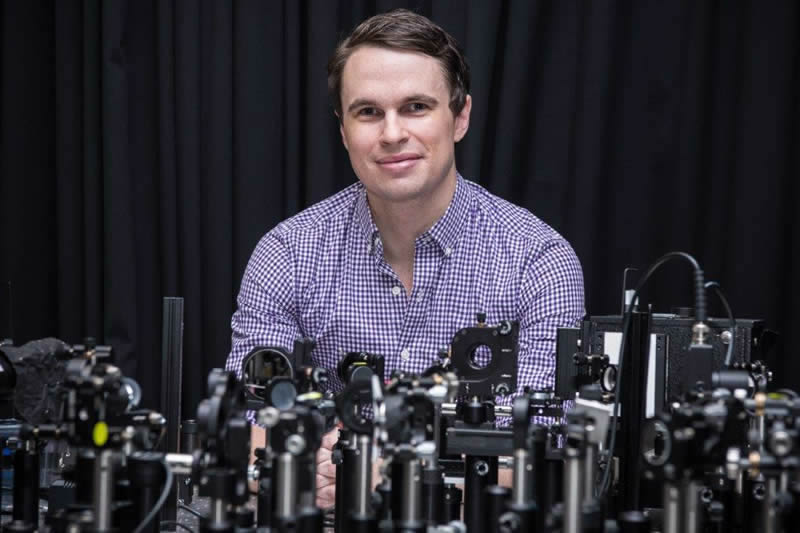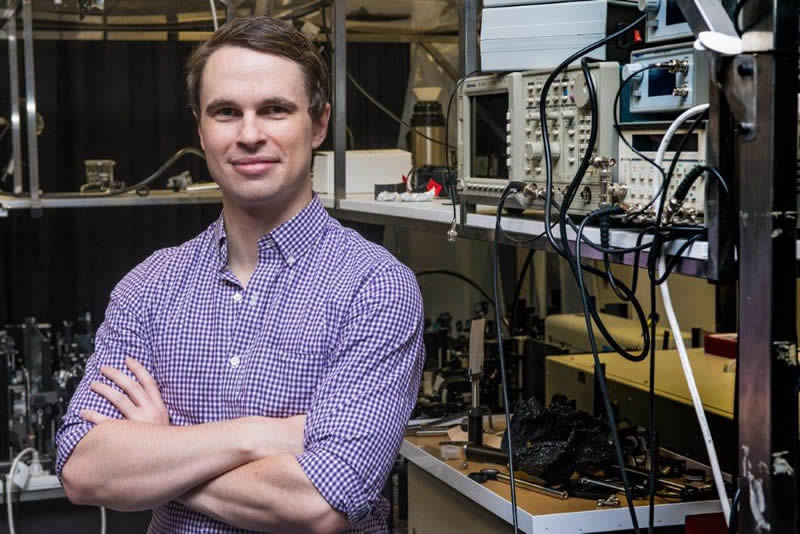KiwiNet News 29 March 2017
Video fingerprinting for border control sees $25,000 award from KiwiNet Emerging Innovator Programme
Hamilton, 29 March 2017
Innovative research on video fingerprinting for border control scanning has resulted in a $25,000 KiwiNet grant for Victoria University of Wellington research scientist Dr Nick Monahan. The grant from the KiwiNet Emerging Innovator Programme, to help nurture innovative new ideas from scientists and support early stage prototype and market development, is one of fifteen made possible by donations from the Norman Barry Foundation.


The grant is enabling Dr Monahan, with a PhD in ultrafast spectroscopy, to develop a prototype handheld device that can rapidly scan passengers and other items in real time to identify prohibited items.
“Our scanning technology uses compact low powered lasers to leverage a portion of the electromagnetic spectrum known as terahertz (THz) radiation to generate ‘fingerprints’. These allow border authorities to identify organic substances that X-rays cannot,” he says.
Dr James Hutchinson, CEO of KiwiNet says, “The increased volume of international passengers, mail and cargo moving between borders presents challenges for border authorities, and creates an opportunity to streamline the border security process with new innovative technology. We’re pleased to support Dr Monahan’s quest to solve this significant industry challenge.”
According to Dr Monahan, existing scanning equipment used for border control is both large and expensive. “The goal is to make video camera technology that uses terahertz radiation, which in this case, is a bit like X-rays in that it can see through packaging and bags to identify prohibited items. The pixels in the terahertz pictures and videos we generate contain fingerprints that record how a material absorbs different wavelengths in the THz spectrum.”
Dr Monahan is building a fingerprinting database to identify small carbon based molecules found in prohibited pharmaceuticals and explosives. The database will be tailored to meet the needs of different border authorities and trigger alerts when target items are scanned.
Dr Monahan says the fingerprinting is incredibly powerful when combined with imaging.
“When we scan a dry bag with items in it that absorbs a lot of THz radiation it might mean that it contains fruit or vegetables. If it contains an orange, then an image of the bag will show a circular area of strong THz absorption signalling to border control staff that a bag, parcel or person needs to be inspected more closely.”
Associate Professor Justin Hodgkiss, Principal Investigator of the Ultrafast Laser Spectroscopy Group at Victoria University of Wellington, says, “Spectral imaging in real time is very difficult: it requires extracting a lot of information from a very weak signal. Dr Monahan’s technology is quicker at detection without compromising sensitivity.”
Dr Anne Barnett, General Manager of Commercialisation at Viclink, Victoria University of Wellington's commercialisation office, nominated Dr Monahan to receive KiwiNet Emerging Innovator Programmeing, and Viclink is continuing to provide commercialisation support.
Ministry for Primary Industries (MPI) was also identified as an ideal proof of concept industry partner. Dr Desi Ramoo, Research and Innovation Practise Lead at MPI says, “MPI’s support for Dr Monahan’s prototyping demonstrates our desire to provide MPI staff with world leading technology developed by New Zealand’s innovative science community. We’ve identified a range of substances that we’re interested in for Dr Monahan to fingerprint. We’ve also highlighted real world applications so his prototype can better meet the needs of both our border authority and others around the world.”
The project additionally received $25,000 KiwiNet PreSeed funding and matching funding from Viclink. This was combined with funding from MPI in order to extend the length of the project and enable the development of a more robust prototype.
The KiwiNet Emerging Innovator Programme is available to early career researchers based at universities and public research organisations across New Zealand. The fund is designed to boost research with a commercial application at a critical time. It also enables researchers to partner with a business and refine their project for market. Recipients also receive expert legal advice from KiwiNet corporate partners, MinterEllisonRuddWatts and IP advice from Baldwins.
Norman Barry Foundation Chairman John Smith says, “It’s great to see our donation help yet another enterprising young researcher develop a proof of concept prototype.”
Dr Monahan says, “I’m very grateful to the Foundation and to KiwiNet as their support has been critical in the development of this technology. I’m also developing invaluable skills not usually developed as a scientist like communicating science and pitching ideas.”
For further information please contact:
Sandra Lukey
Shine Group (PR for KiwiNet)
Cell: +64 21 2262 858
Email: sandra@shinegroup.co.nz
About KiwiNet Emerging Innovator Programme
The KiwiNet Emerging Innovator Programme was established in 2015 by KiwiNet with the generous philanthropic support of the Norman Barry Foundation. The aim of the Emerging Innovator Fund is to have more scientists with disruptive new ideas working alongside businesses to solve industry challenges. It is open to scientists from public research organisation who demonstrate a clever new idea and a willingness to work closely with industry as they develop a prototype. The KiwiNet Emerging Innovator Programme is available to early career researchers based at universities and public research organisations across New Zealand.
About the Norman Barry Foundation
The Norman Barry Foundation, is a charitable trust registered under the Charities Act 2005. Norman Barry was an entrepreneur and a philanthropist who established the Quality Hotel Parnell. During his successful business career, he mentored motel owners in Auckland who were new to the industry and helped various charitable organisations in the form of donations. Norman left his shareholding in Quality Hotel Parnell Limited to the Foundation, and the distributions from this Company to the Foundation are used for charitable donations. In addition, Quality Hotel Parnell Limited is also a registered charity in its own right and this company also makes donations to the community.
